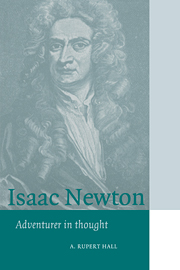Book contents
- Frontmatter
- Contents
- List of Figures
- General Editor's Preface
- Foreword
- Acknowledgement
- 1 The Hopeful Youth, 1642–1664
- 2 “The prime of my age for invention”, 1664–1667
- 3 Widening Horizons, 1667–1669
- 4 The Professor of Mathematics, 1669–1673
- 5 Publication and Polemic, 1672–1678
- 6 Life in Cambridge, 1675–1685
- 7 The Chemical Philosopher, 1669–1695
- 8 The Mathematical Principles of Natural Philosophy, 1679–1687
- 9 Private and Public life, 1685–1696
- 10 Fluxions and Fury, 1677–1712
- 11 Opticks, or a Treatise of Light, 1687–1704
- 12 Life in London, 1696–1718
- 13 A Man of Authority and Learning, 1692–1727
- 14 Later Books, 1706–1726
- 15 Kensington, 1725–1727
- Appendices
- Notes
- Bibliography
- Index
10 - Fluxions and Fury, 1677–1712
Published online by Cambridge University Press: 12 January 2010
- Frontmatter
- Contents
- List of Figures
- General Editor's Preface
- Foreword
- Acknowledgement
- 1 The Hopeful Youth, 1642–1664
- 2 “The prime of my age for invention”, 1664–1667
- 3 Widening Horizons, 1667–1669
- 4 The Professor of Mathematics, 1669–1673
- 5 Publication and Polemic, 1672–1678
- 6 Life in Cambridge, 1675–1685
- 7 The Chemical Philosopher, 1669–1695
- 8 The Mathematical Principles of Natural Philosophy, 1679–1687
- 9 Private and Public life, 1685–1696
- 10 Fluxions and Fury, 1677–1712
- 11 Opticks, or a Treatise of Light, 1687–1704
- 12 Life in London, 1696–1718
- 13 A Man of Authority and Learning, 1692–1727
- 14 Later Books, 1706–1726
- 15 Kensington, 1725–1727
- Appendices
- Notes
- Bibliography
- Index
Summary
Leibniz and Newton
The link between Britain and G. W. Leibniz, now firmly stationed at Hanover though often travelling about Europe in the interests of his master, was decisively broken by the sudden death of Henry Oldenburg early in September 1677. A last letter from him to Leibniz had advised the philosopher to expect no speedy response to his recent mathematical letters from either Collins or Newton; the silence in fact was to last for fifteen years. Whether or not Newton would have been willing to carry on the correspondence with Leibniz, he lacked easy means to do so. Both Collins and Newton studied Leibniz's letters, however. We have no opinion at this stage about Leibniz's mathematical discoveries from Newton himself, but it would seem that he, Collins and John Wallis agreed that Leibniz had (like James Gregory) made an independent discovery of the ‘method of series’ based on the work of earlier mathematicians which he had developed in his own way, and to which he had added an improved ‘method of tangents’. Collins imagined (mistakenly) that Leibniz had gleaned something from Barrow's lectures, and suggested that the Royal Society might print Leibniz's letters to Oldenburg. He never hinted that Leibniz owed anything to Newton.
As previous chapters have shown, Newton did little to promote his calculus in the twenty years after 1671. Leibniz too gave few signs of his slumbering mathematical genius for eight years after leaving Paris.
- Type
- Chapter
- Information
- Isaac NewtonAdventurer in Thought, pp. 249 - 278Publisher: Cambridge University PressPrint publication year: 1996

